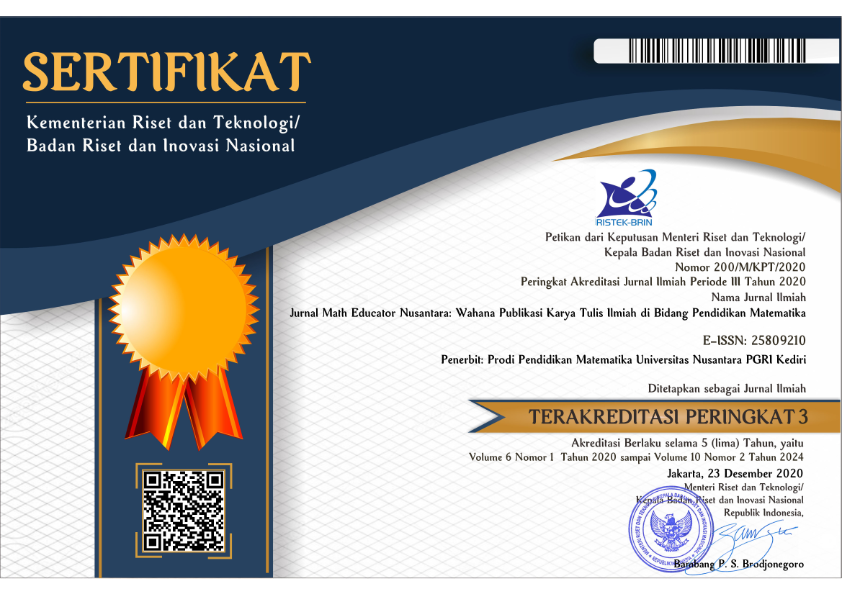Students’ understanding in the subject of statistical method at moodle through scientific approach
DOI:
https://doi.org/10.29407/jmen.v8i1.17461Keywords:
Understanding, Scientific Approach, LMS MoodleAbstract
This study aims to investigate the understanding of mathematics department students in the subject of statistical method at moodle through scientific approach. The research design is qualitative research. The research subjects are fourth semester students of mathematics department at IKIP PGRI Bojonegoro who are chosen using purposive sampling. The data is analysed using data triangulation. The results of study reveal that from all five subjects; in the online learning using moodle; get so easy in understanding the learning materials. The learning becomes flexible; it can be carried out anywhere and anytime. Students are able to study by looking for learning references from other sources. Hovewer, there are several problems in the online learning such as lecturer’s explanation is not as clear as when learning in class, there are more assignments given, and several materials have not been mastered by students. In the online learning, students have to be more focus when it is directed from YouTube. When the students have not understood the learning material in online learning, they can ask it to the lecturer or their classmates. Therefore, five subjects can anwer the questions about homogeneity and balance tests. Their completion steps are precise and perfect.
References
Adi, N. N. S., Oka, D. N., & Wati, N. M. S. (2021). Dampak Positif dan Negatif Pembelajaran Jarak Jauh di Masa Pandemi COVID-19. Jurnal Imiah Pendidikan Dan Pembelajaran, 5(1), 43-48. https://doi.org/10.23887/jipp.v5i1.32803
Argaheni, N. B. (2020). Sistematik Review: Dampak Perkuliahan Daring Saat Pandemi COVID-19 Terhadap Mahasiswa Indonesia. PLACENTUM: Jurnal Ilmiah Kesehatan Dan Aplikasinya, 8(2), 99-108. https://doi.org/10.20961/placentum.v8i2.43008
Arif, M. N., Sumbawati, M. S., Buditjahjanto, I. G. P. A., & Rijanto, T. (2021). Analysis of the Moodle application instrument with the exam browser to measure online learning outcomes in digital communication simulation subjects in class X Multimedia at SMKN 1 Lamongan. International Journal for Educational and Vocational Studies, 3(5), 365-372. https://doi.org/10.29103/ijevs.v3i5.5019
Arwidiyarti, D., & Hikmi, H. C. (2020). Constructing Moodle-Based Online Learning for Vocational School. Jurnal Pilar Nusa Mandiri, 16(2), 191–198. http://ejournal.nusamandiri.ac.id/index.php/pilar/article/view/1481
Basar, A. M. (2021). Problematika Pembelajaran Jarak Jauh Pada Masa Pandemi Covid-19. Edunesia : Jurnal Ilmiah Pendidikan, 2(1), 208–218. https://doi.org/10.51276/edu.v2i1.112
Damayanthi, A. (2020). Efektivitas Pembelajaran Daring di Masa Pandemi Covid 19 pada Perguruan Tinggi Keagamaan Katolik. JURNAL SOSIAL :Jurnal Penelitian Ilmu-Ilmu Sosial, 21(3), 53–56. http://sosial.unmermadiun.ac.id/index.php/sosial/article/view/61
Fitriani, Y. (2020). Analisa Pemanfaatan Learning Management System (Lms) Sebagai Media Pembelajaran Online Selama Pandemi Covid-19. Journal of Information System, Informatics and Computing, 4(2), 1-8. https://doi.org/10.52362/jisicom.v4i2.312
Ine, M. E. (2015, 9 Mei). Penerapan Pendekatan Scientific Untukmeningkatkan Prestasi Belajar Siswa Padamata Pelajaran Ekonomi Pokok Bahasan Pasar. Prosiding Seminar Nasional, 269–285. Universitas Negeri Yogyakarta, Yogyakarta.
Jamaluddin, etc. (2018). Pengembangan Perangkat Perkuliahan Berbasis Pendekatan Saintifik di Program Studi Magister Pendidikan. Jurnal Ilmiah Profesi Pendidikan, 3(1), 30–36. https://doi.org/10.29303/jipp.Vol3.Iss1.47
Jati, G. (2013). Learning management system (moodle) and E-learning content development. Jurnal Sosioteknologi, 12(28), 277–289. https://doi.org/10.5614/sostek.itbj.2013.12.28.3
Junaidi, W. A. &. (2017). Pendekatan Saintifik: Melihat Arah Pembangunan Karakter Dan Peradaban Bangsa Indonesia. Epistemé: Jurnal Pengembangan Ilmu Keislaman, 12(2), 507–532. https://doi.org/10.21274/epis.2017.12.2.507-532
Mayssara A. Abo Hassanin Supervised, A. (2014). 済無No Title No Title No Title. Paper Knowledge . Toward a Media History of Documents, 19(2), 178–192.
Of, O. (2021). Learning Management System (LMS) for Integrating, Monitoring and Evaluating Professional Activities in a Medical Curriculum. The Experience at Humanitas University Medical School. International Journal of Learning Management Systems, 9(2), 1–12. https://doi.org/10.18576/ijlms/090201
Palimbong, A. (2020). Pelaksanaan Pembelajaran Daring pada Masa Pandemi Covid-19 di Program Studi Pendidikan PKn Universitas Tadulako. Jurpis: Jurnal Pendidikan Ilmu Sosial, 17(2), 185–198. http://jurnal.fkip.untad.ac.id/index.php/jurpis/article/view/629
Raharja, S., Prasojo, L. D., & Nugroho, A. A. (2011). Model Pembelajaran Berbasis Learning Management System Dengan Pengembangan Software Moodle Di Sma Negeri Kota Yogyakarta. Jurnal Kependidikan: Penelitian Inovasi Pembelajaran, 41(1), 55-70. https://doi.org/10.21831/jk.v41i1.504
Rahmani, E. F. (2021). Teaching practice during the pandemic outbreak: Perceptions of pre-service english teachers. IJEE (Indonesian Journal of English Education), 8(1), 47-63. DOI: http://doi.org/10.15408/ijee.v8i1.19890
Sadikin, A. H. (2020). Pembelajaran Daring di Tengah Wabah Covid-19 (Online Learning in the Middle of the Covid-19 Pandemic) Ali. Biodik, 6(2), 109–119.
Sari, A. P., & Setiawan, A. (2018). The Development of Internet-Based Economic Learning Media using Moodle Approach. International Journal of Active Learning, 3(2), 100–109.
Winarsih, E., & Sulistyowati, R. (2016). Penerapan Pendekatan Saintifik Dalam Mata Kuliah Umum (Mku) Bahasa Indonesia Untuk Menumbuhkan Budaya Menulis Mahasiswa Ikip Pgri Madiun. Widyabastra: Jurnal Ilmiah Pembelajaran Bahasa Dan Sastra Indonesia, 4(2), 141–157. http://e-journal.unipma.ac.id/index.php/widyabastra/article/view/1682
Wiyanto. (2017). Pendekatan Saintifik Pada Perkuliahan Dengan Sistem E-Learning. Jurnal INTEGRALISTIK, 28(2), 217–229. https://doi.org/10.15294/integralistik.v28i2.13738
Downloads
Published
Issue
Section
License
Authors who publish with this journal agree to the following terms:
- Copyright on any article is retained by the author(s).
- The author grants the journal, the right of first publication with the work simultaneously licensed under a Creative Commons Attribution License that allows others to share the work with an acknowledgment of the work’s authorship and initial publication in this journal.
- Authors are able to enter into separate, additional contractual arrangements for the non-exclusive distribution of the journal’s published version of the work (e.g., post it to an institutional repository or publish it in a book), with an acknowledgment of its initial publication in this journal.
- Authors are permitted and encouraged to post their work online (e.g., in institutional repositories or on their website) prior to and during the submission process, as it can lead to productive exchanges, as well as earlier and greater citation of published work.
- The article and any associated published material is distributed under the Creative Commons Attribution-ShareAlike 4.0 International License














